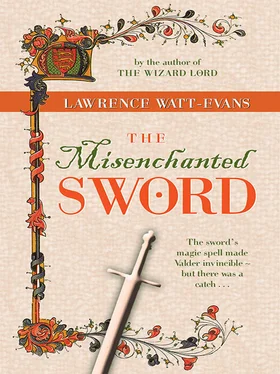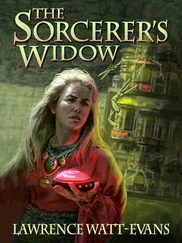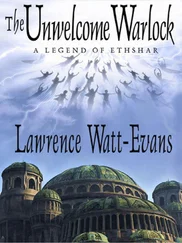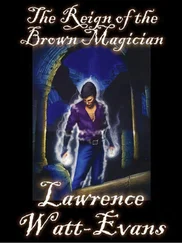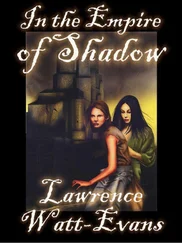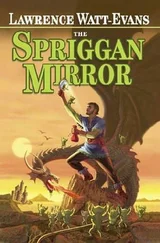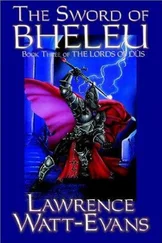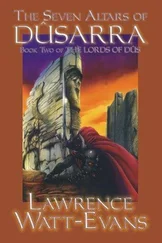Lawrence Watt-Evans - The Misenchanted Sword
Здесь есть возможность читать онлайн «Lawrence Watt-Evans - The Misenchanted Sword» весь текст электронной книги совершенно бесплатно (целиком полную версию без сокращений). В некоторых случаях можно слушать аудио, скачать через торрент в формате fb2 и присутствует краткое содержание. Жанр: Фэнтези, Юмористическая фантастика, на английском языке. Описание произведения, (предисловие) а так же отзывы посетителей доступны на портале библиотеки ЛибКат.
- Название:The Misenchanted Sword
- Автор:
- Жанр:
- Год:неизвестен
- ISBN:нет данных
- Рейтинг книги:4 / 5. Голосов: 1
-
Избранное:Добавить в избранное
- Отзывы:
-
Ваша оценка:
- 80
- 1
- 2
- 3
- 4
- 5
The Misenchanted Sword: краткое содержание, описание и аннотация
Предлагаем к чтению аннотацию, описание, краткое содержание или предисловие (зависит от того, что написал сам автор книги «The Misenchanted Sword»). Если вы не нашли необходимую информацию о книге — напишите в комментариях, мы постараемся отыскать её.
The Misenchanted Sword — читать онлайн бесплатно полную книгу (весь текст) целиком
Ниже представлен текст книги, разбитый по страницам. Система сохранения места последней прочитанной страницы, позволяет с удобством читать онлайн бесплатно книгу «The Misenchanted Sword», без необходимости каждый раз заново искать на чём Вы остановились. Поставьте закладку, и сможете в любой момент перейти на страницу, на которой закончили чтение.
Интервал:
Закладка:
Valder looked at her curiously at that; he had judged her to be in her early twenties, from what he had seen of her, and though he knew well enough that the city had changed greatly in his own lifetime, he had not thought that any great part of the change had been in the past two decades. Furthermore, he had never heard it called “New Ethshar.”
That was none of his concern, though. He buckled the scabbard to his belt, sheathed the sword, and then led the way to Southgate Market. They arrived there without further incident, and the wizard then took the lead, in her turn. Valder followed without protest, but did ask, “Where are we going? From what you’ve said, you don’t live in the city.”
“No, but one of my former apprentices does.”
Once again, Valder found himself puzzled; how could so young a wizard have a former apprentice? She seemed scarcely older than an apprentice herself. Still, he walked on in amiable silence, his feet aching with every step, and discovering bruises from his fall that had not been immediately apparent.
He had lost track of time, but it was obviously quite late; once they were two blocks from the market the streets were deserted, and the torches burning low, some already out. He felt rather burned out himself; it had been a very long and trying day. For a moment he wondered why he was following the wizard, but that passed; after all, she owed him a favor for his help, and might at least save him the price of a night’s lodging.
They arrived, finally, at the door of a small shop in the Wizards’ Quarter, whose sign read “Agravan of the Golden Eye, Wizard Extraordinary.” A light still burned in the window. Valder’s guide knocked twice, and a moment later they were admitted by a young man who did, indeed, have one golden eye, the other being a watery blue.
“Mistress!” he exclaimed. “What kept you? And who is this?”
“I will tell you all about it, Agravan, but first, something to drink, and I think a soft bed would not be amiss—would it, friend? Your questions can wait until morning.”
Valder, who was only semi-conscious by this point, managed to nod agreement; he made it up a flight of stairs, then collapsed upon the offered cot and was instantly asleep.
Chapter Thirty
Valder awoke uncertain of where he was. The night’s events returned gradually, and a glance around reminded him that he was in the loft room of a wizard’s shop. The room was cluttered with books and arcane paraphernalia, jammed on shelves and overflowing from tables; his cot was squeezed into one corner. An unreasonable surge of hope welled up briefly; here he had found himself with a wizard in his debt. Perhaps something could be done about Wirikidor!
That hope faded quickly, however, as he recalled Lurenna’s words. There was nothing that could be done about the sword.
He might, however, have his eyesight restored, if the wizard he had rescued were really grateful. That would be a relief, and might stave off the day when death would be preferable to an enforced life.
He got to his feet, and wished he hadn’t; he had done far too much walking in the past few days, and had slept with his boots on. His legs and feet were aching and itchy and swimming in sweat. He found a filled pitcher his host had thoughtfully provided, and pulled off his boots to swab his feet.
He was involved in this inelegant task when Agravan appeared on the stairs.
“Good morning, sir,” the young wizard called.
“Hello,” Valder replied. “And my thanks for your hospitality.”
“Oh, it’s nothing; I owe Iridith more than I can ever repay, and you’ve put her in your debt, it seems.”
“It’s kind of her to say so.”
“Would you care for breakfast? Iridith is awake, and I’m sure we all have much to tell one another.”
“I would be delighted,” Valder replied, though he was unsure just what he would have to say that would interest the wizards. He pulled his boots back on and followed his host downstairs.
The breakfast was good, but Valder found himself carrying the conversation, explaining in detail Wirikidor’s nature and how he had come to have his sword enchanted in the first place, and his attempts to remedy his situation.
When he had finished, Iridith asked, “Do you really want to die?”
“No,” Valder admitted. “But it does seem preferable to the alternative.”
“Is there only one alternative, though?”
“I told you that I consulted wizards on the matter, and was told that the spell can’t be broken without killing me.”
“That’s probably true; certainly I wouldn’t know how to go about it,” Iridith said, spreading butter on a biscuit. “However, as Tagger the Younger told you, there must be a way around it. I’ve never met the lad, but he sounds like a sensible person.”
“How can there be a way around it? I’ll live as long as I own the sword, and I’ll own the sword for as long as I live; there isn’t any way out of that. I’ll just grow older and older forever unless I kill another eighteen men and allow myself to be murdered. I don’t mind the idea of living forever, but not if I continue to age.”
“Ah, but then why should you continue to age?”
Valder wondered if the woman was being intentionally dense. “I don’t have a great deal of choice in the matter,” he retorted.
“That’s where you’re wrong, though. You do have a choice. Others might not, but you do; you just don’t know it.”
Valder was not sure if the wizard was speaking in riddles or just babbling outright nonsense. “What are you talking about?” he asked politely. He was tempted to be harsher, but the wizard had saved him from injury the night before, as much as he had saved her, and besides, offending wizards was never a good idea.
“How old do you think I am?” she asked.
Playing along with the apparent nonsequitur, Valder answered, “Oh, twenty-one or so.” An honest reply would have been twenty-five.
She smiled, and Valder, who had not really had a chance to see her clearly the night before, was startled by how beautiful her face became when she smiled. “I’m two hundred and eighty-eight.”
Valder could think of nothing to say in reply to such an outrageous claim. He had heard tales of immortal wizards, of course—everybody had—but he had never paid much attention to them. He had seen wizards die, and knew them for mere mortal humans; two of his childhood friends had taken up careers in magic, one as a theurgist and one as a wizard, yet both had remained ordinary people outside of their magical abilities.
“I don’t think you believe me,” Iridith said, reading his face, “but it’s true. I served as a combat wizard for a century under Admiral Sidor and Admiral Dathet; I was retired long before Azrad came to power, and before you were born. I grew up here before the city wall was built, before the Palace was built, before the New Canal was dug. There are spells to restore or preserve youth indefinitely.”
“Why haven’t I ever heard of them, then?” Valder asked skeptically.
“You’ve never heard of wizards centuries old?”
“Certainly I have, but just rumors—and most of those wizards were supposed to look old, not young and beautiful.”
She smiled again. “My thanks for the compliment; my face is my own, only my age is of thaumaturgical origin. Not all wizards who can restore youth choose to do so; many prefer to stay the outward age at which they learned the spells that prevent aging. Since that’s usually not until one is sixty or seventy years old, many of the ancients like myself still look old. I was vain enough—and weary enough of eating with false teeth—that I chose otherwise. I was … let me see … seventy-four when I learned the secrets.”
Читать дальшеИнтервал:
Закладка:
Похожие книги на «The Misenchanted Sword»
Представляем Вашему вниманию похожие книги на «The Misenchanted Sword» списком для выбора. Мы отобрали схожую по названию и смыслу литературу в надежде предоставить читателям больше вариантов отыскать новые, интересные, ещё непрочитанные произведения.
Обсуждение, отзывы о книге «The Misenchanted Sword» и просто собственные мнения читателей. Оставьте ваши комментарии, напишите, что Вы думаете о произведении, его смысле или главных героях. Укажите что конкретно понравилось, а что нет, и почему Вы так считаете.
